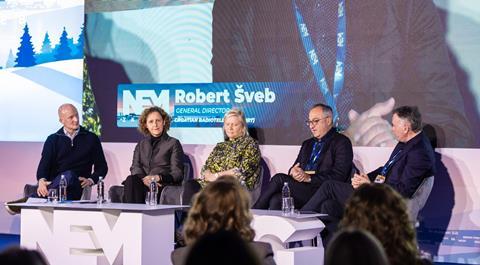Noel Curran says political shifts are affecting funding for some European public broadcasters

European Broadcasting Union (EBU) chief Noel Curran has warned that public service media (PSM) are facing increasing political pressure as funding mechanisms take centre stage in a battle for control.
Curran, who was speaking today at NEM Zagreb in Croatia, said that in 2023 the licence fee model of funding – used by numerous broadcasters across Europe including the UK’s BBC – accounted for less than 50% of overall PSM funding for the first time in Europe.
Several countries have shifted models over recent years, with France moving from a licence fee to a proportion of sales tax last year.
Curran said other countries were also facing PSM financing changes and said government control was a factor in some cases.
“There is a lot of political pressure – let’s be upfront about it – particularly in some countries where certain politicians and political parties aim to gain greater control over public service media,” he said.
“They are becoming much more direct in how they exert that control. Funding issues often accompany this type of pressure because funding is frequently used as leverage: ’You do this, or you don’t get your funding.’”
Curran added that the EBU does not prescribe one funding model over another, highlighting Germany – where PSM funding is financed via a broader household tax – as a model that works for that country.
And while the licence fee remains key for many of his members, Curran warned of the risks associated with having PSM financed by an annual funding mechanism that governments can directly control and change at will.
Ministerial thinking
Croatia is soon set to start a public consultation on funding options for its public broadcaster, HRT, and Nina Obuljen Koržinek, Minister of Culture and Media, suggested hybrid models are being explored.
“We have ambitions although there is a way to go,” Koržinek told NEM Zagreb, during the panel hosted by Broadcast International.
“At the moment we are trying to find a third way and by the time we start public consultations, I think we will propose something that is a bit different to the usual models.” Koržinek was unable to discuss specifics, but she said “various models” were being explored.
“We will propose something that will guarantee the necessary independence but at the same time, deliver a sustainable and solid form of funding. But let’s be clear, this is not an easy task,” she added.
The EBU’s Curran added that while “significant competition” is being felt as US-based streamers and social media companies expanded, his members still invest around €21bn (£17.7bn) annually in European content.
“Public service media also remains the most trusted media source — in 90% of countries, PSM is rated number one,” he continued, adding that his members were looking to adapt to new tech developments including artificial intelligence.
“Yes, I worry about the pressures, but there is still so much being provided that is worth fighting for, especially now, as we witness the growing polarisation of the world,” he added.
The point was underlined by Natalija Gorščak, president of the management board at RTV Slovenija, which has faced its own funding struggles over recent years.
Gorščak pointed to the role of RTV Slovenija in providing a forum for independent discussion around the future of nuclear energy in the country, where a referendum on the development of a second power plant was recently cancelled.
“It shows the importance of PSM as a strong player on the media landscape,” she told delegates.
“We showed the good sides but also the bad sides, we included all the information. And it is really relevant that all topics are discussed before they come into political debate. This is what PSM is for, it is an open parliament.”
Robert Šveb, general director at Croatian Radiotelevision (HRT), added that his organisation’s focus remained on engaging across demographics.
“As PSM, we have to serve the entire population and that means all different parts of the audience,” he said, pointing to the importance of both news and sports coverage.
HRT has also enjoyed success with a recent remake of Norwegian format Skam, known locally as Sram, which Šveb said had performed with younger viewers.







No comments yet